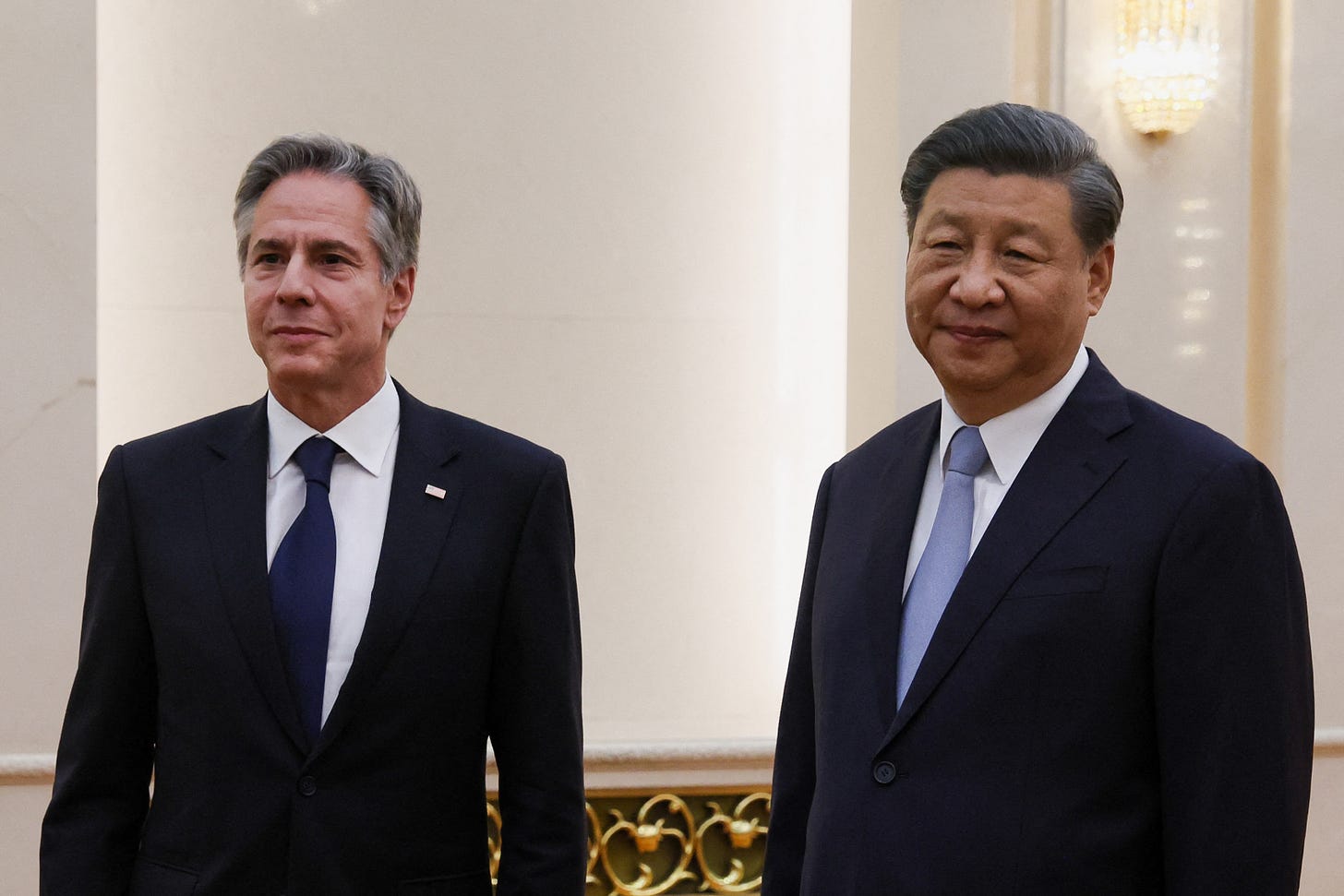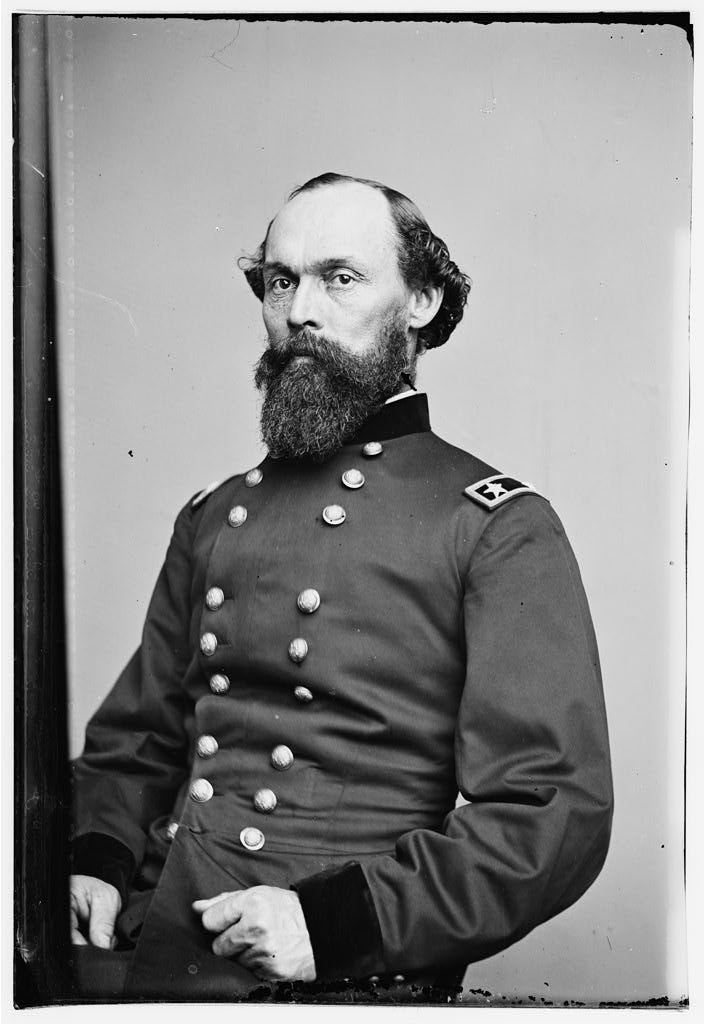TL(PM) DIGEST: Little Trouble in Big China
Plus the EU falls further and further behind America economically, Americans willing to intervene to stop violence against women and dogs, and commemorating the Juneteenth holiday

1. Secretary Blinken goes to Beijing
What happened? Secretary of State Blinken finally traveled to Beijing, where he met with a number high-ranking Chinese officials including Chinese Communist Party head Xi Jinping. No real breakthroughs appear to have been made, but Secretary Blinken extended an invitation to his Chinese counterpart to visit Washington and “continue the discussions.”
Why does it matter? Secretary of State Blinken’s trip to China represents the first visit of America’s top diplomat to the country since 2018, and comes amidst growing tensions between the two nations. A number of pundits and analysts in the United States have issued increasingly insistent calls for talks between Beijing and Washington in recent months, even though high-ranking officials from both America and China have met and discussed issues like global debt relief in various forums over the past year.
TLP’s take: It’s good that top officials and diplomats from the United States and China continue to meet face-to-face, but no amount of talk can paper over the very real divergence of geopolitical and economic interests at play or diametrically opposed values of the United States and the Chinese Communist Party. It’s better to acknowledge these deep and profound differences rather than pretend that dialogue will somehow smooth them out all on its own.
2. Europe’s economy lags further and further behind America’s
What happened? Financial Times columnist Gideon Rachman notes that the European Union has fallen behind the United States on a host of economic measures ranging from GDP—America’s economy is a third bigger than the EU’s—to Big Tech companies to university rankings. This divergence has only grown since the 2008 financial crash, when the EU embarked on a decade-long austerity experiment while the United States pushed through a large stimulus package.
Why does it matter? Europe’s economic lag compared with the United States means that America’s allies on the continent will have relatively fewer resources to contribute to collective defense even as the demand for those resources rises in the wake of Russia’s war against Ukraine. The absence of a fiscal union, moreover, makes it much more difficult for the EU to mobilize financial resources on the scale the United States can.
TLP’s take: Like it or not, America will need to stay involved in Europe for the foreseeable future—we have the national resources and the political capital to help keep the continent relatively united, while political and diplomatic differences between EU member nations makes it extraordinarily difficult for Europe to get its act sufficiently together an act with any strategic coherence. America still serves as the rebar that keeps Europe together, no matter what some Asia-first analysts might claim or ambitious European leaders might wish.
3. Americans willing to intervene to stop violence against women—and dogs
What happened? YouGov presents interesting data from last year exploring if and how Americans feel it is important to intervene in dangerous or anti-social behaviors by others. Violence towards women—and dogs—tops the list of appropriate times to directly intervene.
Why does it matter? More than half of U.S. adults say people should intervene verbally, at a minimum, if they witness “a man making sexual advances toward a woman who appears to be severely intoxicated” or “a person violently kicking their dog,” while nearly seven in 10 adults say to call 911 if they witness “a man hitting his female partner.” In contrast to this obviously egregious behavior, Americans are a bit more reticent to intervene if “a parent slaps their young child who is misbehaving” or if there’s a store fight over mask use.
TLP’s take: It’s encouraging to see common sense ethics and standards remaining strong among Americans. Despite all our myriad dumb political differences, most people in most places understand the difference between right and wrong and are willing to do something about it to help others, when necessary—particularly when bad things happen to innocent people.
4. America honors the official end to slavery and victory over the Confederacy
What happened? Today is “Juneteenth,” a recently official federal holiday that recognizes the final emancipation and liberation of black Americans from slavery by Union troops in Galveston Bay, Texas on June 19, 1865.
Why does it matter? Although President Abraham Lincoln had issued his famous Emancipation Proclamation two years earlier and Confederate forces formally surrendered at Appomattox on April 9, 1865, slavery remained in place in Texas until the U.S. Army issued General Order Number 3 declaring:
The people of Texas are informed that, in accordance with a proclamation from the Executive of the United States, all slaves are free. This involves an absolute equality of personal rights and rights of property between former masters and slaves, and the connection heretofore existing between them becomes that between employer and hired labor.
TLP’s take: America’s ongoing culture wars shouldn’t obscure the importance of both fully understanding and examining our own nation’s history. It’s difficult for modern Americans to imagine decades of legal and enforced slavery of black people in our own country.
Hundreds of thousands of Americans lost their lives trying to escape slavery or end it entirely, and we owe them our thanks for acting on President Lincoln’s clear moral statement that, “Those who deny freedom to others, deserve it not for themselves; and, under a just God, can not long retain it.”
Just one more thing…
How do you smuggle millions of dollars worth of meth from Canada to New Zealand? Put it in maple syrup jars, apparently.





